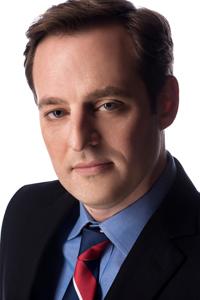Inside Obama's Post-9/11 Presidency
New York Times Reporter Charlie Savage Talks About "National Security State" in Conversation Led by Professor Matthew C. Waxman
New York, November 30, 2015— The preponderance of lawyers in the White House helps explain why President Barack Obama retained many of the most controversial national-security policies of his predecessor, George W. Bush, despite having campaigned against them, said New York Times reporter Charlie Savage in a Nov. 12 discussion at Columbia Law School.
| In his new book, Pulitzer Prize-winning reporter Charlie Savage looks at the ways in which the Obama administration’s lawyerly disposition defined its counterterrorism tactics. |
Savage's new book, Power Wars: Inside Obama’s Post-9/11 Presidency, looks at the ways in which the Obama administration’s lawyerly disposition defined its counterterrorism tactics, adhering to the legally sanctioned status quo. A Pulitzer Prize winner for his coverage of the Bush administration, Savage spoke about his latest book in a conversation led by Matthew C. Waxman, the Liviu Librescu Professor of Law and chair of the Roger Hertog Program on Law and National Security, which co-sponsored the event with the Columbia chapter of the American Constitution Society.
Waxman noted that many students in attendance may one day become national security lawyers. “You've got a 700-page book that focuses on the inner-workings of the legal machinery, yet it's still a gripping story because of how important the lawyering is,” Waxman said. “Oftentimes legal decision-making in the counterterrorism area becomes de facto policy decision-making.”
While George W. Bush and Dick Cheney “favored people with business and military backgrounds,” Savage said, Barack Obama and Joe Biden have filled their senior-level positions with attorneys.
“There is something uniquely legalized about the decision-making process in this era—you cannot understand Obama's record without bringing a legal lens to bear on it, because it was saturating how they thought and talked about problems.
“But there's a broader point. A lot of rules—I mean the ordinary legal framework in domestic or international law—were written in the 20th and 19th centuries for different situations than the world and the country faces now.” Laws regarding surveillance, he explained, were written largely before the Internet, while the law of war applied to conflicts among states, not open-ended battles against terrorist groups. “In many cases, you find the rules didn’t envision the situation we’re in today,” Savage said.
“Every law school now teaches national security law, but that was not the case before 9/11. It was a legally shallow field. There was not a well-developed body of precedent and no law professors who had spent their lives thinking about these issues. Most of the people teaching these classes now are people like Matt,” Savage said, nodding at Waxman, who before coming to Columbia had held senior positions at the U.S. State Department, the Defense Department and the National Security Council. “They learned on the job and then went into the academy to convey what they had to learn on the fly. It was all new, because so many questions were being asked that had never been asked before.”
Soon after Obama took office, Savage published a story on the new administration's reluctance to change many existing national-security policies. “By February ’09, it became clear that a lot of issues were going to continue.” The new administration had already reiterated the state secrets privilege in court in an attempt to block lawsuits challenging surveillance and torture practices, and in their confirmation hearings, Attorney General Eric Holder and CIA Director Leon Panetta both affirmed that indefinite detention without trial was a legitimate and lawful tool for holding al Qaeda suspects, even if Guantanamo were to close.
Savage’s book opens on what he considers to be the pivotal moment, February 6, 2009. “Obama has been president two weeks, and he’s going to be briefed about all these secret surveillance programs that he’s inherited from Bush, stuff like the NSA’s program that is collecting records of everyone’s domestic phone calls, which is supposed to be turned off at the end of this month. Representatives of the national security state—the FBI, the NSA, the director of national intelligence—tell him about how Bush put this program into place unilaterally in 2001, and how in 2006 the [Foreign Intelligence Surveillance Court, or FISA court] had started to authorize it. Congress knows about it, so all three branches know. There are some problems, but they’re fixing them.
“It’s not clear that [Obama] recognized the pivotal moment. They didn’t ask him, ‘Do you want to keep this?’ In the same breath that they told him about it, they told him it’s important and it’s legal, and it sort of slides through. Bringing the FISA court onboard, and rooting [the collection of phone data] in this claim of the Patriot Act was very important. The reform seemed to solve the problem. It didn’t look like the NSA was trying to violate the law, so the question was just how to add some more process and oversight to make sure they stay within those bounds, because this didn't seem to be a ruined program.
“That's really illustrative of how the lawyering mindset would approach the problem. Is there a legal basis for this? The national security state says it's necessary. If there is a legal basis, then there’s no problem. Someone else might have asked: Do we want to have a program where everyone's phone calls are being kept track of? But that's not the way a lawyer approaches it.”
After the event, Waxman described how Columbia Law School is training the next generation of leaders in the field of national security law. "Discussions like the one with Charlie are important for teaching students not only about the substance of law and policy in this area but also the ethics, techniques, and dilemmas of lawyering."
"The real-world approach we take to training in this area," Waxman noted, "is why so many students come here to study it."
